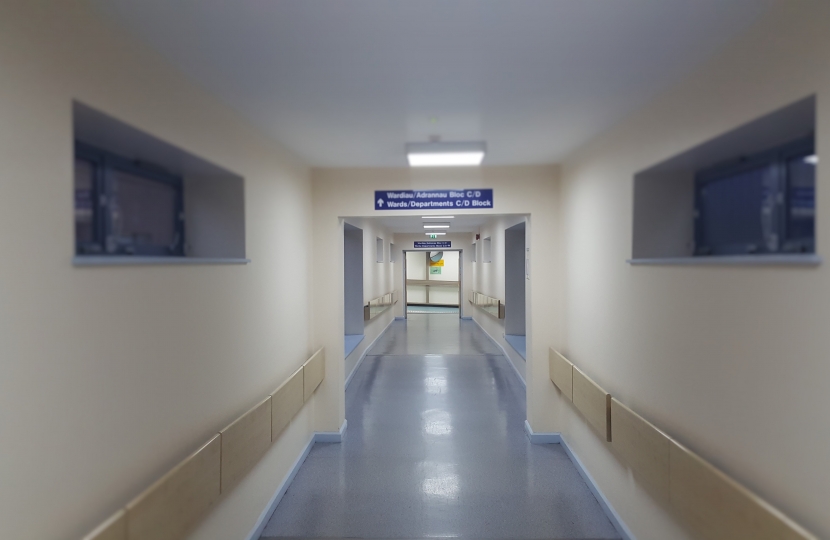
Speaking in the Welsh Conservative Debate on Cross Border issues here in May 2009, I stated “cross-border movements in health services are a long established fact of life- reflecting geographic and demographic realities”.
I referred to the Welsh Affairs Committee report on Cross-border health services then, which concluded that there was a lack of effective communication between the Welsh Government and Department of Health in England – and called for the two to work together to ensure that Welsh residents’ rights to access English services are protected – and vice versa.
They considered that an improved government-level protocol was essential to standardise and clarify funding arrangements and accountability mechanisms – stating that the result should be seamless care for patients based on clinical need.
The Flintshire governors on the board of the Countess of Chester Hospital had stated that their hospitals of first choice are the Countess of Chester and the teaching hospitals of Liverpool - and Orthopaedic patients had expressed their need for continued access to Gobowen Hospital.
They referred to the Welsh Affairs Committee statement that “citizen engagement should not stop at the border” – and to Flintshire Local Health Board’s annual report the previous year, which said that more Flintshire patients were treated as out-patients, day-cases or emergency cases at the Countess of Chester Hospital than at either Wrexham Maelor or Glan Clwyd hospitals.
Although the Welsh Government Health Minister during the third Assembly stated that her “overriding aim was to secure as many services as can be safely provided within Wales’s boundaries” – and although the impartial Assembly Research Service told me “I have spoken to a Welsh Government official who has confirmed that it is Welsh Government policy to repatriate Welsh patients presently served in English inpatient settings” – the last Welsh Health Minister wrote to me stating “This information is incorrect. There is no hidden policy to repatriate Welsh patients”.
However, in a meeting with the Countess of Chester Hospital in September 2013, I was told that Betsi Cadwaladr University Health Board was reducing or cancelling referrals and pulling activity back across the border, despite not having the capacity.
As they said, the focus should be the patient – and they wanted to contribute to the provision of quicker, better and more economic cross border care.
Early last year, the Welsh Government announced that it was commissioning pain management clinics from England after waiting lists in Wales reached 78 weeks.
I had been contacted by constituents in pain, who had always received their treatment at the Countess of Chester, but were now instead being added to long waiting lists in Wales.
When I took this up with the Health Board, they acknowledged that there was a waiting time for this service, but said they had not been able to secure additional NHS capacity in north west England.
So, I contacted the Chief Executive of the Countess of Chester, who replied that Wales “withdrew from their pain service two years previously and as a consequence they could no longer accept Welsh referrals.”
But he added that “maybe this is something that you might discuss with the Welsh Government ‘to see if there's a political will for us to be seen as part of the North Wales acute healthcare solution.”
When I did this, however, the then Health Minister simply passed the buck back to the Health Board.
Although the Wales/England protocol for Cross Border Healthcare Services was implemented in April 2013, leading to improved communication, The Welsh NHS Confederation states that the “decision-making process on each side of the border needs to be more coordinated, coherent and transparent”.
AND the 2015 Welsh Affairs Committee Report on Cross “Border health arrangements between England and Wales” expressed concern “that there is a lack of communication regarding changes to healthcare services which could have an impact across the border” and recommended “ that formal protocols are put in place to ensure consultation between Welsh Local Health Boards and English Clinical Commissioning Groups when changes to services impact on populations across the border”.
50% of people in Wales live within 25 miles of the border.
As Dr Dai Lloyd said here in 2009 “Mature nations work together across boundaries in historical time-honoured fashion for the better health provision of all of their people”.
AND as I then said “ We must avoid at all costs a slate curtain in services between these two British Nations.
Our long and porous border should be a cause for celebration and cooperation rather than an obstacle to efficiency and effectiveness”.